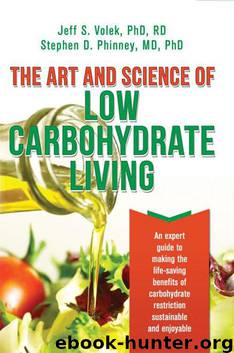The Art and Science of Low Carbohydrate Living: An Expert Guide to Making the Life-Saving Benefits of Carbohydrate Restriction Sustainable and Enjoyable by Jeff Volek

Author:Jeff Volek [Volek, Jeff]
Language: eng
Format: epub
ISBN: 9780983490739
Publisher: Beyond Obesity LLC
Published: 2011-07-08T05:00:00+00:00
Chapter 12
LOW CARBOHYDRATE RESEARCH PITFALLS
Introduction
When a research paper is published in a peer-reviewed journal, we are conditioned to think of it as an observation that probably can be believed as true until it is either confirmed or refuted by subsequent research. You observe something new and report it. Your observation is subjected to scrutiny and it either holds up or not. If it does, you get credit for the discovery. This is plain vanilla science.
But in the real world, when a research paper is published that reinforces a concept that we very much want to believe, ‘we’ – the mainstream consensus – treat it as dogma. After all, if we want to believe that a few thousand years of agricultural exposure has irrevocably shifted our genetic makeup away from a couple of million years of evolutionary pressure generated by our hunting ancestors, what’s to stop us?
If this sounds overly cynical to you the reader, please accept our apologies. But if you have ever tried to argue the case for data over dogma, perhaps this sounds familiar.
But let’s frame it another way. Every year or so, there’s a high profile case in which a scientist fabricates data to generate a high profile publication. This is clear scientific malfeasance. Fame, fortune, and federal grants ride on high profile publications. Some of these people forfeit their research careers, and some go to jail.
But what rarely makes the news is the much more common situation where a scientist designs a study with a particular result in mind. Say that your preliminary data tell you that you’ll probably see the result you want after 1 week or 2 weeks, but that result wouldn’t be likely to persist if you continue for 4 or 6 weeks. Is it wrong to do just a 2 week study?
Another surprisingly common situation is that a scientist chooses not to publish ‘embarrassing data’, or decides to present it in a way that avoids the reader drawing the logical (but embarrassing) conclusion. But isn’t there a peer-review ‘checks and balances’ system in place to ensure proper scientific methods and that logical conclusions are made? Yes, ideally this is true, but the reality is that the peer-review system is far from perfect, and in particular tends to favor findings in line with the consensus. More often than not, editors and anonymous experts chosen to review the paper give their uncritical acceptance rather than grapple with the uncomfortable data. On occasion an astute reviewer may call-out the scientist with the comment “your data do not support your conclusions”, but this is more of a rarity than the norm.
What would motivate a scientist to take a chance that s/he might get such feedback.
Can we all say ‘peer-pressure’? How about ‘calculated risk’?
What We Publish, And What We Cite
Science, in general, and the nutritional sciences in particular, have become highly conformist. Smart scientists go to their scientific meetings, listen to the discussion, and come to understand what is acceptable and what is not. Those who ignore this readily available information do so at their own risk.
Download
This site does not store any files on its server. We only index and link to content provided by other sites. Please contact the content providers to delete copyright contents if any and email us, we'll remove relevant links or contents immediately.
The Bone Broth Miracle: How an Ancient Remedy Can Improve Health, Fight Aging, and Boost Beauty by Ariane Resnick(16613)
How to Be a Bawse: A Guide to Conquering Life by Lilly Singh(7488)
The Fat Loss Plan by Joe Wicks(4921)
The Ultimate Bodybuilding Cookbook by Kendall Lou Schmidt(3946)
The French Women Don't Get Fat Cookbook by Mireille Guiliano(3662)
A Jewish Baker's Pastry Secrets: Recipes from a New York Baking Legend for Strudel, Stollen, Danishes, Puff Pastry, and More by George Greenstein(3601)
Better Homes and Gardens New Cookbook by Better Homes & Gardens(3595)
Super Food Family Classics by Jamie Oliver(3420)
Dinner in an Instant by Melissa Clark(3163)
Bread Revolution by Peter Reinhart(3143)
Tom Kerridge's Dopamine Diet: My low-carb, stay-happy way to lose weight by Kerridge Tom(3110)
Body Love by Kelly LeVeque(3060)
Ottolenghi - The Cookbook by Yotam Ottolenghi(2947)
Flavor Flours by Alice Medrich(2866)
Tone Your Tummy Type by Denise Austin(2849)
The Fat Chance Cookbook by Robert H. Lustig(2836)
Oh She Glows Every Day by Angela Liddon(2781)
LL Cool J's Platinum 360 Diet and Lifestyle by LL Cool J(2736)
The Kitchen Counter Cooking School by Kathleen Flinn(2520)
